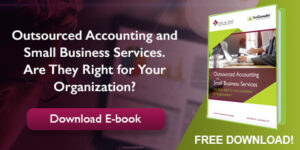
Reduce COVID-19 Financial Impacts by Outsourcing Finance, Accounting and HR Functions

Outsourcing may appeal to organizations that are currently struggling with mounting overhead costs during the COVID-19 crisis. By outsourcing, certain fixed overhead costs associated with compensating and supporting employees are converted into flexible costs that can be scaled back in an economic downturn — or dialed up in times of growth and transition.
One department that’s ripe with outsourcing opportunities to reduce administrative time and cost is finance and accounting. You can find professional services providers of these specialized, time-consuming services such as payroll processing, tax preparation and bookkeeping. You can even outsource the controller or CFO function. But do the benefits of outsourcing these tasks outweigh the potential downsides?
Recognize the upsides
Outsourcing finance and accounting functions allows you to work with financial professionals of varying levels of experience and expertise tailored to the tasks they’ll perform. These responsibilities could include:
- Processing payables, receivables and cash transactions
- Reconciling accounts at each month-end
- Preparing financial statements, budgets and forecasts
- Assisting with tax and financial reporting requirements
- Communicating financial matters to the shareholders or board of directors
Depending on your needs and budget, you can outsource the tasks that make sense for the organization. You also may benefit from occasionally using other firm professionals — investment advisors, HR and IT support, and valuation specialists, as necessary. COVID-19 has put a significant strain on businesses’ HR functions, and this could be an area where opportunity exists as it relates to outsourcing recruiting activities, interviewing and writing policies. For businesses looking to sell, a valuation may be the first step in determining the baseline value of the business to move forward. When looking at investments and the long-term financial impacts of COVID-19, it is often important to stress-test the plan to determine if the savings, investments and insurances will allow you to meet your financial goals.
Another benefit that many smaller organizations derive in working with external accounting and financial service providers is reduced fees for year-end audit and tax services — because of the professional attention to accounting and finance functions received throughout the year. And most of the accounting questions that typically arise in an audit already will have been resolved.
Be aware of the trade-offs
Cost is a top concern when outsourcing these functions. But keep in mind that, with an outside firm, you pay only for the amount and level of services required.
For example, an in-house accountant may spend some time doing work that someone at a lower pay level could handle equally well. Outsourcing also will spare the organization the expenses associated with a regular employee, such as payroll taxes, health insurance, paid leave and training to stay atop any tax law or regulatory changes and continuing education requirements.
If you use an outsider to perform the duties of the CFO or controller, that person may not be at your immediate disposal whenever a financial question arises. Meetings with the CPA firm will need to be planned and scheduled. You’ll also need to determine how financial data will flow between your company and the accountant who is providing these services. Some tasks may be difficult to perform remotely.
To outsource or not to outsource?
Outsourcing finance and accounting functions is a smart move for many organizations — but it’s not right for everyone. Contact us to discuss the pros and cons of using this strategy in your organization.
